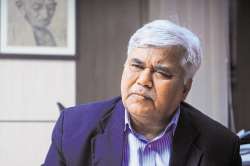IUC maths scientific, no question of favouring anyone: TRAI Chairman dismisses charges of non-transparency
Sharma said the IUC charge finalised by TRAI was driven by considerations of consumer and industry interest, competition and march of technology

India’s telecom regulator on Wednesday dismissed charges of non-transparency in its decision to slash call connect rate to 6 paise per minute, much to the dismay of large incumbent telecom operators. TRAI Chairman R S Sharma today dismissed the charges, saying the cost calculation is objective and scientific and there is no question of "helping or harming" any operator.
Speaking to PTI, Sharma said the IUC charge finalised by TRAI was driven by considerations of consumer and industry interest, competition and march of technology.
The Telecom Regulatory Authority of India decided yesterday to slash the charge paid by an operator for terminating a mobile call on a rival network -- also called the interconnection usage charge (IUC) -- to 6 paise a minute, from the current 14 paise.
The regulator had further said no such charge would apply from January 1, 2020.
Leading telecom operators Bharti Airtel and Vodafone have criticised the regulators decision on the call connect charge, alleging that the move will benefit only one operator and worsen the financial health of the stressed industry.
Sharma maintained that TRAI had gone purely by the cost calculations, backed by data and models and had no discretion in the matter.
"We have no authority to change the costs. Where is the question of helping or harming someone?" Sharma asked.
He said TRAI has, in fact, been "conservative" in its approach on setting a 2020 deadline for phasing out the charge.
"In case there are changes in the entire scheme of things and it has to be reviewed, we have right to look at it one year from implementation. We will keep a close watch on developments of new technology," he pointed out.
Sharma refused to comment on the possibility of older operators approaching courts on the IUC rate cut, saying in a free country, people have the right to approach legal forums.
"It is a free country and there is democracy. Everyone has right to approach legal forum. I have no comment to offer," he said.
Rejecting allegations by Bharti Airtel and Vodafone that the rate cut favoured one operator in particular, Sharma emphasised that the exercise was only about computation of costs based on the work done by a network.
The detailed methodology on which TRAIs calculations are based is part of the explanatory memorandum to the regulations all of which have been placed in the public domain now, he added.
"It is not as if TRAI has utilised a discretionary power. There is detailed computation for public view," Sharma said.
Sharma added that TRAI has adopted a rigorous process in arriving at the new IUC charge and noted that the consultations had spanned 13 months encompassing open house, comments and counter-comments from the industry.
"The cost particulars have been taken from submission of service providers to TRAI. There is a detailed explanatory memorandum running into 62 pages and Annexure giving the methodology of calculation of termination charge. The computation has been done in a scientific and objective manner," the TRAI chief asserted.